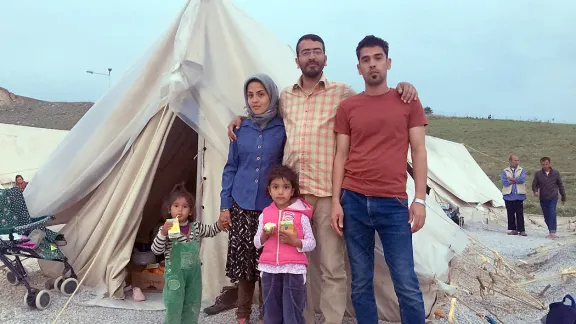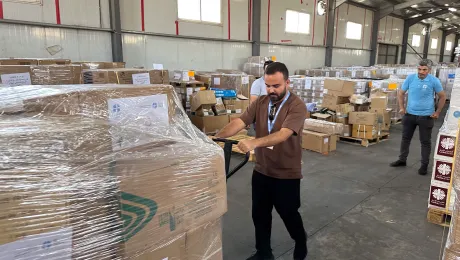
Mahdi and his family were threatened with death and kidnapping by the Taliban and fled Afghanistan for Europe, together with his brother-in-lawâs family. The families were shot at when crossing the Iranian - Turkish border, which was covered with barbed wire. In the process they were separated from 10 family members. Photo: LWF/J. Schreier
A changing situation
“Greek volunteers made up an important component of those providing assistance to refugees,” LWF Humanitarian Support Officer Joshua Schreier said after a visit to the Koutsochero refugee camp in Greece.
The situation is Greece is quickly changing. By April 7, Greece was hosting more than 30 camps for more than 50,000 asylum seekers following the closure of the Macedonian-Greek border, the western Balkan route to northern Europe being effectively shut down. Before that, almost all of the refugees only spent a few days in Greece while transiting the country.
The Koutsochero camp is about 20km outside of the city of Larisa, in central Greece. According to government data, the camp is sheltering 834 people, but local camp management suggests there are more than 1,800 people, making it one of the larger camps. Its population is roughly 50 percent Afghan and 50 percent Syrian. Although it was only set up a few weeks ago, the camp appears well established and organized. “I got a very real sense that the Greek people were trying to do what they could for the refugees,” Schreier says.
I got a very real sense that the Greek people were trying to do what they could for the refugees
In early April, LWF sent two World Service staff to Greece, supported by a colleague from Church of Sweden’s psychosocial roster to assess the situation of the migrants and refugees and plan for possible LWF engagement. A decision is pending on the Concept Note submitted by LWF to partner with UNHCR in providing assistance in the form of camp management services, emergency assistance, and psychosocial support.
According to the latest statistics from UNHCR, the three largest national groups in Greece are Syrians, Afghans and Iraqis. Greece is currently hosting more than 54,000 refugees.

The Koutsochero camp is situated in the countryside in central Greece. The site was only erected mid-March, but is a completely functional camp.

Each tent can house six people. Camp administration is integrating asylum seekers of different nationalities by intermixing small groupings of Syrian and Afghan tents in each of the camp’s housing areas. This measure is taken to avoid segregation by nationality.

Women wash clothes at water taps. Although the camp is just three weeks old, lamp posts are installed throughout the camp. This is especially important in camp settings, as badly lit areas, such as around toilets, have put women at risk for aggression or sexual violence in several other refugee situations before.

Aid workers organize a game for the children. At this moment, there are no formal education activities for the children in the camp. The exact number of children in the camp is not known, but according to UNHCR statistics, 38 percent of the refugees throughout Greece are children.

Mahdi from Afghanistan with his four year old daughter, who had just returned from a trip to a local park. She'd brought Mahdi a flower, which he holds in his hand. In fleeing Afghanistan, Mahdi lost his mother, brother and two sisters. His brother-in-law, Hamza, is desperate to hear of what happened to his wife, son, father, mother and brother. Hamza's wife was eight months pregnant when they were separated in February. He does not know what happened to her.

Refugees stand at a charging station for mobile phones. With dependable information lacking from other sources, at the moment for refugees their phones are the only connection to family and friends, and the only means to receive information from the outside world.

The camp also provides a free wifi area. Lacking reliable information, many people depend upon rumors they hear from friends, through social media and informal networks to try to plan their move onward in Europa. The need for information and connectivity is great in a situation where the refugees are stranded in a foreign country and are struggling with separation from loved ones and facing an uncertain future.
Photos: LWF/J. Schreier


